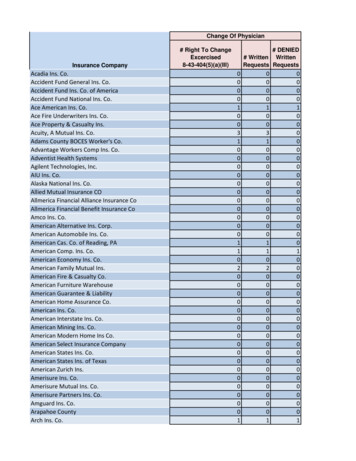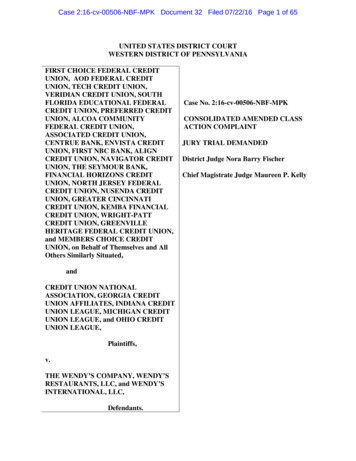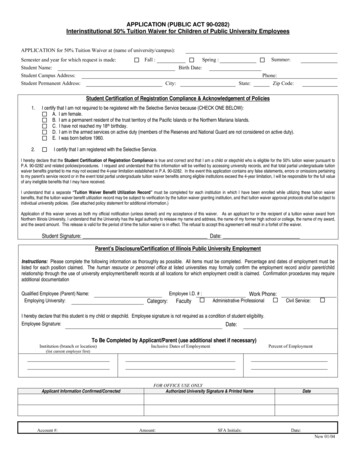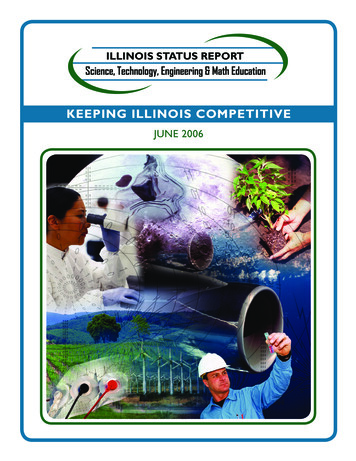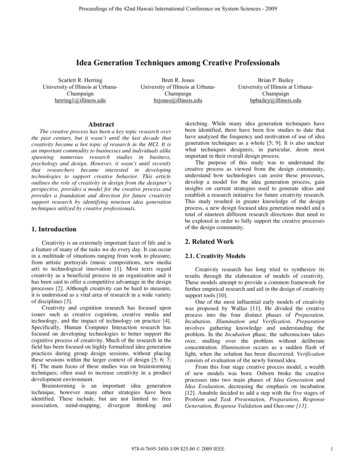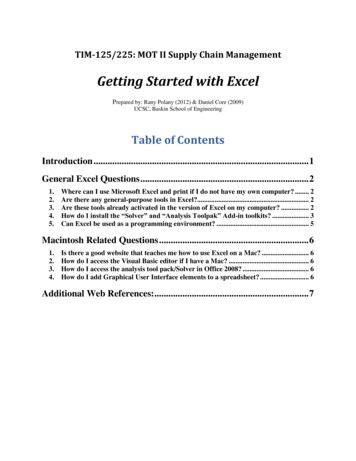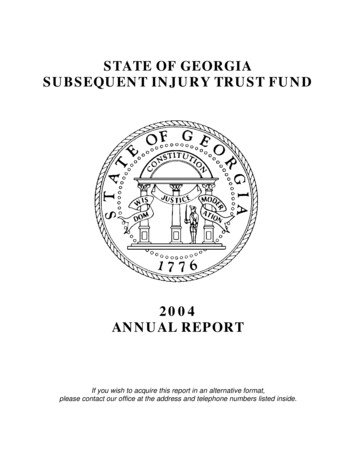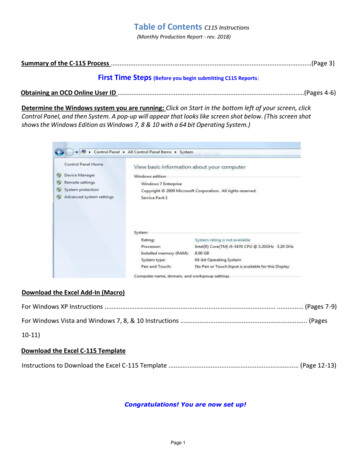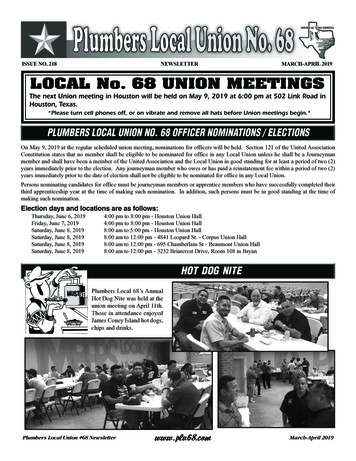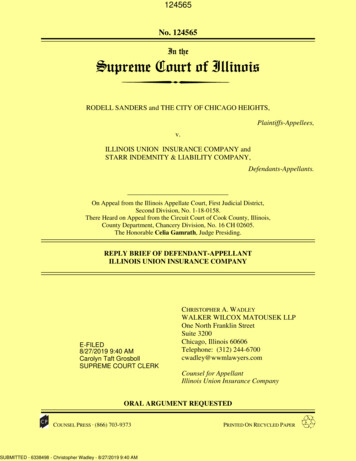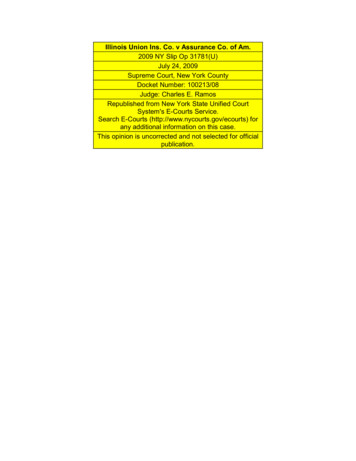
Transcription
Illinois Union Ins. Co. v Assurance Co. of Am.2009 NY Slip Op 31781(U)July 24, 2009Supreme Court, New York CountyDocket Number: 100213/08Judge: Charles E. RamosRepublished from New York State Unified CourtSystem's E-Courts Service.Search E-Courts (http://www.nycourts.gov/ecourts) forany additional information on this case.This opinion is uncorrected and not selected for officialpublication.
[* 1 ]UED ON 8 7 2009SUPREME COURT OF THE STATE OF NEW YORKCPRFfFMT.C- NEW YORKCOUNTYGIndex Number : 100213/2008ILLINOIS UNION INSURANCE COMPANYvs .ASSURANCE COMPANY OF AMERCA,INDEX NO.llMOTION DATEMOTION SEQ. NSEQUENCE NUMBER : # 001MOTION CAL. NO,SUMMARY JUDGMENTrere read on this motion to/forNotice of Motion/ Order t o Show Cause - Affidavits - Exhibits-.Answering Affldavlts - ExhibitszReplyfngAffldavlts3Cross-Motion:v)0PEE1 YesEl No.IPAPER6 NUM EqEDIIIIUpon the foregoing papers. it Is ordered that thls motion.Dated:Check one:-aZ/z- fb7E QAM0gS-S-C-d F I N A L DISPOSITIONCheck if appropriate:El NON-FINAL DISPOSITION17 DO NOT POSTL1 REFERENCEIj".,/
[* 2 ]SUPREME COURT OF THE STATE OF NEW YORKCOUNTY OF NEW Y0RK:COMMERCIAL DIVISION-XILLINOIS UNION INSURANCE COMPANY,Plaintiff,Index N o . 100213/08-againstASSURANCE COMPANY OF AMERICA,Charles Edward Ramos, J.S.C.:Defendant, Assurance Company of America (Assurance) movesIfor summary judgment.Plaintiff Illinois Union Insurance Company(Illinois) cross-moves for t h e same relief.BackqroundThis is a dispute involving t w o insurance carriers seekingto avoid paying f o r litigation defense.’In September 2002, t h einsured, El Dorado Surgery Center (El Dorado), was sued byVictoria Cronnelly for breach of contract, breach of impliedcovenant of good fair and fair dealing, slander, intentionalinterference with contractual relations, intentional interferencewith prospective economic advantage, intentionalmisrepresentation, and negligent misrepresentation.Illinois agreed to fully defend El Dorado under its policyand reserved its right to deny coverage.Illinois alleges thatat t h e end of 2005, approximately t h r e e months before trial, itlearned that El Dorado had a general liability policy withIllinois incurred costs of 517,734.77 by defending theinsured, El Dorado Surgery Center in t h e underlying action.
[* 3 ]Assurance and immediately sought a copy. Transcript, December 11,2008, Page 18.In February 2006, a jury awarded Cronnelly 30,000 on t h e negligent misrepresentation count, which wassubsequently paid by El Dorado.In May 2006, El Dorado advisedAssurance that Illinois stopped paying defense coatsapproximately six months prior and that El Dorado had paidapproximately 54,000 out of pocket and was assessedapproximately 100,000 for outstanding bills.In July 2007, anIllinois claims representative reviewed and disputed the attorneyrates applied in El Dorado's defense, and reduced the outstandingbalance owed to it for defense c o s t s to 3 2 , 9 0 3 . 7 0 , whichAssurance reimbursed to El Dorado.In J a n u a r y 2008, Illinois filed this action seeking fullreimbursement of the t o t a l amount expended on behalf of El Dorado( 517,734.77) from Assurance.Alternatively, it seeks equitablecontribution of one-half of the defense costs plus interest.Choice of LawIt is undisputed that. California law applies to this matter.Where t h e parties' arguments reflect an assumption that onestate's law applies, such implied consent to use a forum's law issufficient to establish choice of law. Tehran-Berkeley C i v i l&Environmental Engineers v T i p p e t ts-Abbe t t -McCarthy-Stratton, 888F 2 d 239, 242 (2d Cir 1989).In addition, because both theIllinois arid Assurance policies were issued to El Dorado inCalifornia, a n d El Dorado is a California entity with itsprincipal p l a c e of business in California. See C e r t a i n2
[* 4 ]Underwriters at Lloyd's, London v Foster Wheeler C o x p , 3 6 AD3d1 7 , 21-22[20061 , affd, 9 NY3d 9 2 8 ( 2 0 0 7 ) .Summary JudqmentThe proponent of a motion for summary judgment must make aprima facie showing of entitlement to judgment as a matter of lawby tendering sufficient evidence to eliminate any material issuesof fact as to the claim or claims at issue. A l v a r e z v ProspectHosp., 68 NY2d 320, 3 2 4 (1986). Failure t o make such a showingrequires denial of the motion, regardless of the sufficiency ofthe opposing p a p e r s . W i n e g r a d v New York U n i v . M e d . C t r . , 6 4 NY2d851,853[19851).Once the prima facie showing has been made, t h e p a r t yopposing a motion f o r summary judgment b e a r s the burden of"produc[ing] evidentiary proof in admissible form sufficient torequire a trial of material questions of fact" Amatulli v D e l h iC o n s t r . C o r p . , 7 7 NY2d 5 2 5 (1991).DiscussionI.Estoppel and WaiverIn support of its motion for summary judgment, Assuranceraises t h r e s h o l d issues.Namely t h a t Illinois is estopped fromseeking contribution or indemnification in this action because itassumed arid controlled the insured's entire defense under aninsufficient reservation of rights.Illinois a g r e e d to fully defend El Dorado in the u n d e r l y i n gaction, reserving its right to deny coverage specifically " f o rany amounts due under an employment contract or for punitive3
[* 5 ]damages to t h e extent those damages are n o t insurable," and to"the extent that any damages are attributable to any fraudulent,dishonest or criminal conduct." Letter to El Dorado fromIllinois, February 3 , 2004. Additionally, the reservation ofrights provided a "catch all" provision to deny coverage based ongrounds "other than those expressly set forth in this letter . . . "Id. Notably, Assurance fails to address this.California and New York are consistent on the issue ofestoppel and waiver, and therefore, the Court will apply New Yorklaw to this issue. Excess I n s . Co. L t d . v Factory Mut. I n s . C o . ,2 AD3d 1 5 0 , 1 5 1 [lst Dept 20031, affd, 3 NY3d 5 7 7Bank, N . V . v C i t i b a n k , N . A . ,[20041; SNS7 AD3d 3 5 2 , 354 [lst Dept 2 0 0 4 1 .New York courts apply principles of equitable estoppel where aninsurer, although not obligated to provide coverage, undertakesthe defense of the case and fails to assert policy defenses orreserve its privilege to deny coverage, and in reliance, theinsured s u f f e r s the detriment of losing t h e right to control itsown defense.In such circumstances, though coverage may notexist, the insurer will not be heard to say so. See A l b e r tS c h i f f A s s o c i a t e s , Inc. v F l a c k , 5 1 NY2d 6 9 2American S u r . Co. of N . Y . ,J.(1980); O'Dowd v3 NY2d 347 (1957); Gerka v F i d e l t y &C a s . C o . , 251 NY 51, 57 (1929). However, Assurance fails to citeany authority that establishes that the reservation of rightslanguage cant-ained in I l l i n o i s ' letter to El Dorado on February3 , 2004 was not an adequate reservation of rights.Assurance argues that, while estoppel is based on prejudice,4
[* 6 ]such prejudice is implied as a matter of law where the insurerhas complete control of the case. A l b e r t J . S c h i f f A s s o c i a t e s , 51NY2d at 699. Although the theory is correct, it is inapplicablehere.As in the several c a s e s Assurance cites for thisprinciple, the invocation of equitable estoppel requiresprejudice suffered by the parry seeking to invoke it (here, theinsured). Assurance fails to raise a triable issue that itsuffered prejudice as a result of Illinois' control of thedefense, and t h e insured, El Dorado, is not a party to thisaction to raise the issue itself.Therefore, the argument fails.Waiver is the voluntary and intentional relinquishment of aknown right. C e n t . G e n . Hosp. v C h u b b Group of I n s . C o s . , 9 0 N Y 2 d195, 201 (1997). Any assertion that Illinois waived i t s right toindemnification and/or contribution assumes that Illinois hadknowledge of the Assurance policy, and voluntarily chose todefend the insured without reserving its rights to seek suchrelief.Illinois alleges that it learned of Assurance's policyin late 2005, approximately three months before trial, andimmediately sought a copy of the policy.No evidence has beensubmitted by Assurance to the contrary, arid thus no waiverargument can be supported by the current record.11.Duty to DefendIt. is well est.ablished that an insurer's duty to defend isbroader than its duty to indemnify, and arises whenever theallegations of the complaint create a potential for indemnityunder the policy. GGIS I n s . S e r v i c e s , Inc. v S u p e r i o r C o u r t , 1685
[* 7 ]Cal App 4th 1493 (2d Dist 2008), p e t i t i o n d e n i e d , 2009 Cal LEXISFurthermore, if an insurer is bound to defend an action1321.based on the assertion of one covered claim, it must defend theentire action even though some portions of it involve non-coveredclaims. C o u n t y of San B e r n a r d i n o v P a c . I n d e m . C o . , 56 C a l App4th 666, 689 (4th Dist 1997) , p e t i t i o n d e n i e d , 1997 Cal LEXIS6282.Although an insurer owing a d u t y to defend must defend theentire underlying action, allocation of defense costs may laterbe apportioned in certain situations involving multiple insurers.Id.It should be noted that Assurance repeatedly makes theargument that there is an “unusual p r o v i s i o n ( / 2 in Illinois’policy in which Illinois agreed to defend uncovered claims aspart of “Covered Loss” as long as one covered claim is alsoalleged.However, as cited above, this provision is clearlyconsistent with t h e common law in California, and is thus not“unusual” at a l l .J . ALLOCATION:In the event any of t h e Insureds in a Claim incur both Lossthat is covered by the Policy, either because such Claim includesboth covered and uncovered matters or because such C l a i m is madeagainst both covered and uncovered part-ies, then coverage will beallocated as follows:1.100% of Costs, Charges, Expenses incurred by s u c hInsureds on account of such Claim will be allocated ascovered Loss; and2,Any remaining loss incurred by such I n s u r e d s on accountof such Claim will be allocated by the parties betweencovered Loss and uncovered Loss using a l l reasonableefforts based upon the legal liabilities of each of theparties to such matters.6
[* 8 ]111. Liability of Defense Costs Under the PoliciesIllinois Union issued an Employment Practices (EPC) andDirectors and Officers Liability (D&O) policy to El Dorado,effective January 3 , 2003 to January 3 , 2004, with a 1 millionlimit under each coverage part.Section A , titled "InsuranceClause," of the EPC section delineates Illinois' coverageobligation: "[Illinois] shall pay on behalf of the Insured's Lossresulting from any Claim first made during the Policy Period fora Wrongful Act. ' j 3A "Claim" is defined in relevant part in theEPC section as "any written or oral demand for damages or otherrelief against any of the I n s u r e d s " that is "brought by or onbehalf of an Employee."The EPC section defines "employees" inrelevant part as "all persons who were,C)noware or shall be"any individuals w h o are leased or arecontracted to perform work for theCompany, or are independent contractorsfor the Company, but only if suchindividuals perform work or servicess o l e l y for or on behalf of the Corn any. Thus, to qualify as an "Employee" u n d e rthe policy, t h eplaintiff in the underlying case, Victoria Cronnelly, had to beperformingservicessolelyfor Doradoandto herMarshallA "Wrongful Act, in relevant part, means any actual oralleged:c)breach of an actual or implied employment contract; orI'.h)k)defamation, libel, slander . . .wrongful infliction of emotional distress, mentalanguish or humiliation.Emphases are supplied t-hroughout this decision unlessotherwise noted.7
[* 9 ]Hospital, which excludes her from coverage.However, the policyprovides coverage for an “Employee” that “shall be” working solelyf o r El Dorado.Litigation in this action is ongoing arid discoveryhas not determined whether Cronnelly could beworkingsolelyforElDorado.categorized asNevertheless,becausetheallegations Cronnelly raised in the complaint potentially arecovered under t h e EPC section, Illinois’ defense obligation for theentire Cronnelly action is triggered, subject to its reservation ofrightsto d to reimbursement from Assurance for certain defense costswhere allegations are potentially covered in whole or in part bythe Assurance policy, or reimbursement from the insured whereallegations are found to not be covered in any policy. See Buss vS u p e r i o r C o u r t , 16 CalQt”35 (Cal 1997).The D&O section of Illinois’ policy states that Illinois”shall pay on behalf of the Company Loss resulting from any Claimfirst made against the Company during the Policy Period for aWrongful Act!” except:1.[Illinois] shall not be liable to makeany payment under this Coverage Sectionin connection with any Claim:11)baaed upon, arising out of,directly o r indirectly resultingfrom, in consequence of , or in anyway involving any employment oremployment related matters b r o u g h tby or on b e h a l f of a director,officer, or employee, including anyvoluntary, seasonal , temporary,leased or independent contractedetnployee of the Company. ExclusionC(1)(n).8
[* 10 ]It is clear from the above exclusion that coverage is notafforded to Cronnelly under the D&O section of the Illinoispolicy.Assurance issued a general liability policy to El Dorado,effective March 1 , 2002 until canceled, with a 1 million peroccurrence limit.Specifically, Coverage B of the policy affordsEl Dorado coverage for "those sums that the i n s u r e d becomeslegally obligated to pay as damages because of \personal andadver-tising injury.IfThe Assurance policy's definition of"personal and advertising injury" includes '' [olral or writtenpublication of material that slanders or libels a person."Byits plain language, the Assurance policy potentially covers theCronnelly slander claim, and thus triggers Assurance's duty tobear the defense costs afforded to this claim.111. Primary vs Excess Insurance CoverageA final pivotal issue in this matter is whether the languageof the applicable policies are primary or excess.Insurancepolicies are construed under the same rules that govern theinterpretation of contracts. Accordingly, a policy must beinterpreted to give effect to the mutual intent of the parties atthe time of contracting, and such intent is ascertained, ifpossible, from the "clear and explicit" language of t h e contract.St. P a u l M e r c u r y Ins. C o . v Frontier P a c i f i c I n s . C o . , 111 CalApp 4th 1234, 1243 (4tt1Dist 2003), r e h e a r i n g d e n i e d , 2003 CalApp LEXIS 1402, p e t i t i o n d e n i e d , 2003 Cal LEXIS 9883.Ifcontractual language is clear arid explicit, it governs. Id.9On
[* 11 ]t.he other hand, when policy language is ambiguous, rulesapplicable to resolving ambiguity control. Id.There is a clear distinction between primary and excessinsurance coverage.Primary coverage is insurance coveragewhereby liability attaches immediately upon the happeningOftheoccurrence that gives rise to liability. A m e r i c a n Casualty C o . vG e n e r a l S t a r I n d e m n i t y C o . , 125 Cal App 4th 1510, 1521 (2d Dist2005).Primary insurers generally have the primary duty ofdefense. Id.Excess or secondary coverage is coverage whereby,under the terms of the policy, liability attaches only after apredetermined amount of primary coverage has been exhausted. IdIn making a determination of whether an insurance policyprovides primary or excess coverage, and of the priority ofliability of policies, courts examine the provisions of allpolicies involved. S c o t t s d a l e Ins. C o . v S t a t e Farm M u t u a lA u t o m o b i l e Ins. Po., 130 Cal A p p 4th 890, 904 (2d Dist 2005) ,rehearing d e n i e d , 2 0 0 5 Cal App LEXIS 1175, p e t i t i o n d e n i e d , 2005Cal LEXIS 11644."Other insurance115clauses become relevant only whereseveral insurers insure the same risk at the same level ofcoverage. T r a v e l e r s Casualty&Sur. Co. vAm.E q u i t y I n s . C O . , 93' Most insurance policies contain "other insurance" clausesthat attempt. to limit the insurer's liability to the extent thatother insurance covers the same risk. Such clauses attempt tocontrol the manner in which each insurer contributes to or sharesa covered l o s s . Courts generally honor the language of otherinsurance clauses when no prejudice to the interests of theinsured will ensue. T r a v e l e r s Casualty 6; Sur. Po. v A m . E q u i t yIns. C o . , 93 Cal App 4th 1142, 1149 (1" Dist 2001).10
[* 12 ]Cal A p p 4th 1142, 1150( l e tDist 2001).The Assurance policy is clearly primary, by i t s terms, tothe extent that it covers certain of Cronnelly's claims.Itstates:5.Other InsuranceIf other valid and collectible insuranceis available to the insured for a l o s swe cover . . . our obligations are limitedas follows:a.Primary InsuranceThis insurance is primary exceptwhen b. below applies.6 If thisinsurance is primary, ourobligations are not affected unlessany of the insurance is alsoprimary.Illinois' policy contains an excess clause, which providesin p a r t :C.EXCLUSIONS2."To the extent it is insured underany other existing valid policy,whether such other insurance isstated to be primary, excess,contingent or otherwise . . .provided, however, this exclusionshall not apply to the amount ofLoss which is in excess of theamount of any deductible and thelimit of liability of such otherpolicy where such Claim isotherwise covered by this CoverageSection."This language makes it apparent that the Illinois policy isexcess only to the extent that El Dorado has coverage underanother policy covering the same t - y p e of claims as the claimsIt is undisputed that no exception under 5 ( b ) areapplicable, and therefore it will not be addressed.11
[* 13 ]covered by the Illinois policy.As noted above, "otherinsurance" claims are only applied when coverage is concurrent oroverlapping.Here, the slander claim is the only claim fittingthis description, and thus, the Illinois policy is excess to thisclaim only.Otherwise, both policies are primary coveringdifferent losses of the insured.IV.Prejudgment InterestIllinois seeks prejudgment interest on any additional fundsthat are to be reimbursed to Illinois by Assurance as a result ofthis motion.CPLR 5001 provides that "[iln an action of anequitable nature, interest and the rate and date from which itshall be computed shall be in the court's discretion."Here, toIllinois' c r e d i t , it p r o p e r l y protected t h e interests of theinsured by not immediately disputing its defense obligation.However, it failed to properly investigate t h e existence othervalid insurance policies, the discovery of which may haveobviated the need to litigate this matter.It follows that theequities do n o t justify an award of interest in this action.All other ar,guments were considered and are without merit.Accordingly, it isORDERED rhat defendant's motion for summary judgment ishereby granted, in part., and denied, in part, as indicated above;and it is f u r t h e rORDERED that plaintiff's motion for summary judgment ishereby granted, in p a r t , and denied, in p a r t , as indicated above;and it. is further12
[* 14 ]ORDERED that the action shall continue.Settle o r d e r .D a t e d : July 24, 2 0 0 9J.S.C13
Illinois Union Ins. Co. v Assurance Co. of Am. 2009 NY Slip Op 31781(U) July 24, 2009 Supreme Court, New York County Docket Number: 100213/08 Judge: Charles E. Ramos . ILLINOIS UNION INSURANCE COMPANY, -X Plaintiff, Index No. 100213/08 -against- ASSURANCE COMPANY OF AMERICA,
